期人教版英语八年级下册教案:unit 1 grammar focus
- 格式:doc
- 大小:22.02 KB
- 文档页数:1
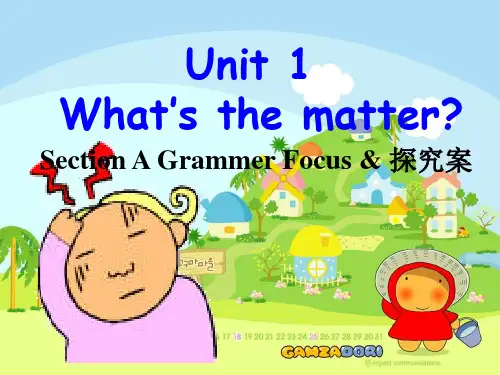
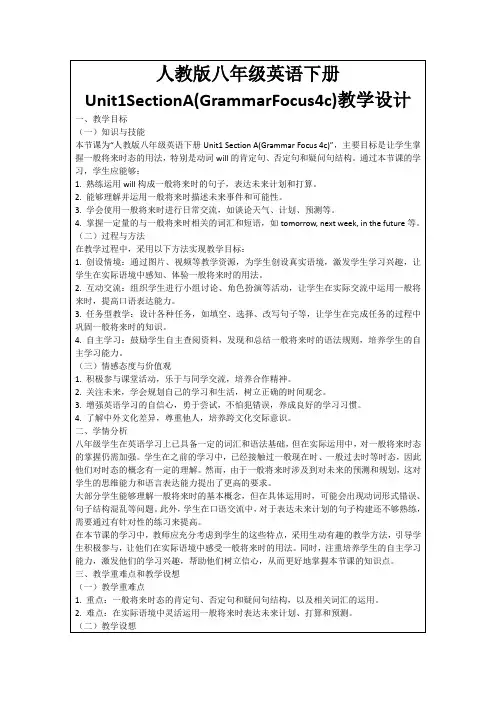
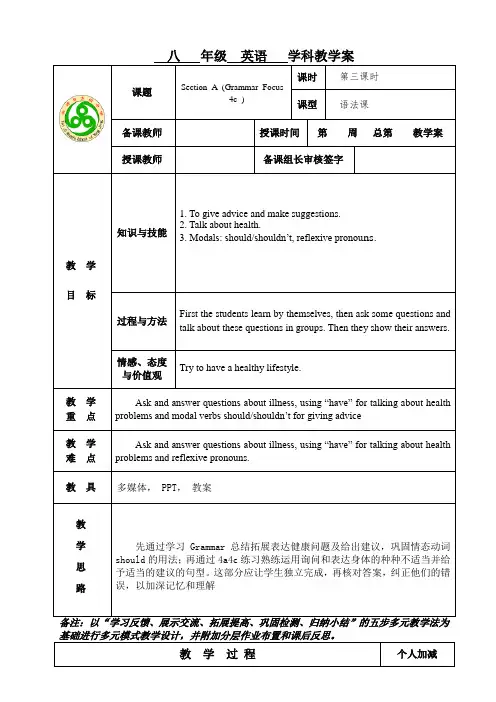
八年级英语学科教学案课题Section A (Grammar Focus4c )课时第三课时课型语法课备课教师授课时间第周总第教学案授课教师备课组长审核签字教学目标知识与技能1. To give advice and make suggestions.2. Talk about health.3. Modals: should/shouldn’t, reflexive pronou ns.过程与方法First the students learn by themselves, then ask some questions andtalk abou t these questions in groups. Then they show their answers.情感、态度与价值观Try to have a healthy lifestyle.教学重点Ask and answer questions about illness, using “have” for talking about health problems and modal verbs should/shouldn’t for giving advice教学难点Ask and answer questions about illness, using “have” for talking about health problems and reflexive pronouns.教具多媒体, PPT,教案教学思路先通过学习Grammar总结拓展表达健康问题及给出建议,巩固情态动词should的用法;再通过4a4c练习熟练运用询问和表达身体的种种不适当并给予适当的建议的句型。
这部分应让学生独立完成,再核对答案,纠正他们的错误,以加深记忆和理解教学过程个人加减1.Fill in the blanks in 4a.2.Check the students’ answers.3.Practice the conversations with your partner .4.Circle the best advice for these health problems in 4b.5.Give your own advice for these health problems in groups .One student describes a problem . The other student guesses the problem and gives advice , just like the conversation in 4c.3.拓展提高1) 反身代词不能单独做主语,但可以做主语的同位语,起强调作用。
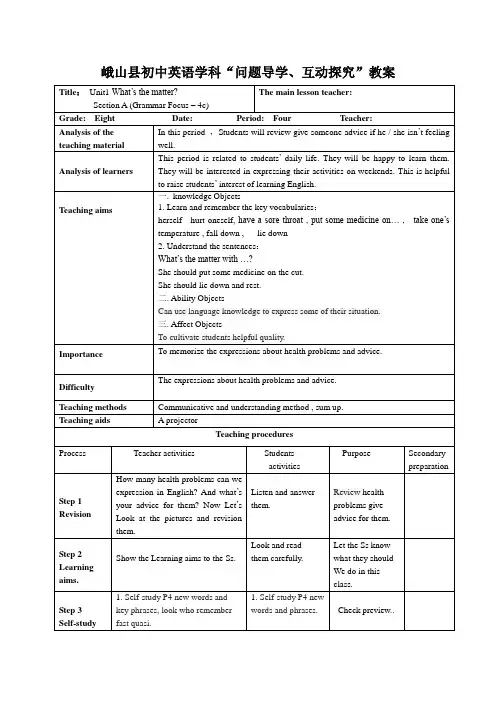
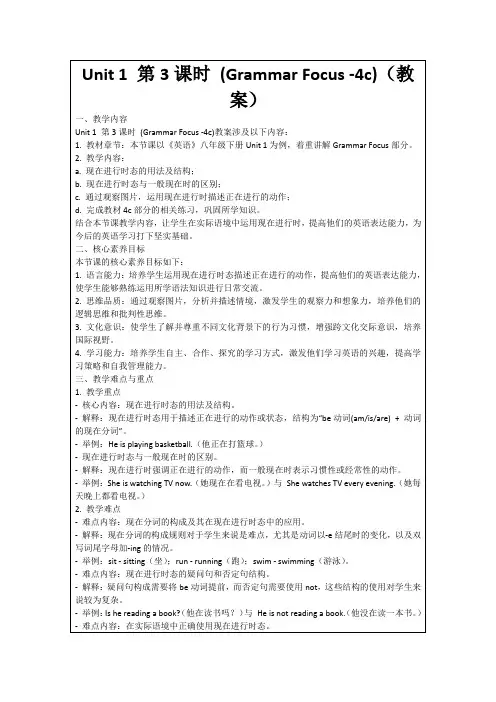
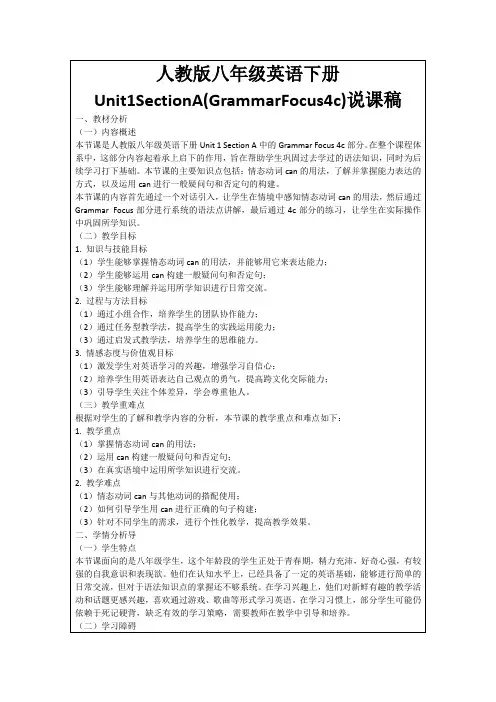

人教版八年级下册Unit1 What's the matter?Section A 4a-4cGrammar Focus【学习目标】1.知识技能目标掌握并灵活运用本课的重点词汇herself重点短语give advice, fall down, go home and rest, cut herself, have colds语法重点:反身代词和情态动词should的用法2.能力目标:学生能够在日常生活中灵活的运用所学的单词和句子和他人交流。
3.情感态度目标:主动关心身体不适的人并给予适当的建议【重点难点】使用should, shouldn’t 给出合理的建议。
根据不同的病症给出多个合理建议。
教学过程:Step1:Warm upThe teacher show some pictures the people in it all have some different problems. Then teacher ask the students use the following sentences to ask and answer in pairs.What ‘s the matter with sb?Sb ...What should sb do?Sb should...In this way, the students can review the lesson they learnt last class and stimulate their knowledge.Step2:Presentation1. The teacher show the key sentences in grammar focus and there are some blanks, the students should fill in the blanks according to the Chinese meaning. And then the students would read the sentences together.2. The teacher lead the students to sum up today’s key words and the grammar:①询问他人健康状况可以说:What's the matter?What's the matter with sb(宾格)?→you/ him/ her/ it/ us/ them...What's wrong?What's wrong with sb?②反身代词又称为自身代词,表示动作行为反射到行为执行者本身。
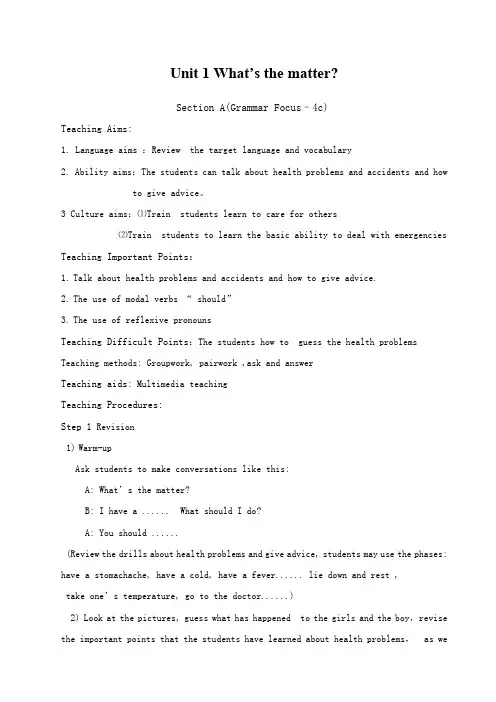
Unit 1 What’s the matter?Section A(Grammar Focus–4c)Teaching Aims:1. Language aims :Review the target language and vocabulary2. Ability aims:The students can talk about health problems and accidents and howto give advice。
3 Culture aims:⑴Train students learn to care for others⑵Train students to learn the basic ability to deal with emergencies Teaching Important Points:1.Talk about health problems and accidents and how to give advice.2.The use of modal verbs “ should”3.The use of reflexive pronounsTeaching Difficult Points:The students how to guess the health problems Teaching methods: Groupwork, pairwork ,ask and answerTeaching aids: Multimedia teachingTeaching Procedures:Step 1 Revision1)Warm-upAsk students to make conversations like this:A: What’s the matter?B: I have a ...... What should I do?A: You should ......(Review the drills about health problems and give advice, students may use the phases: have a stomachache, have a cold, have a fever...... lie down and rest ,take one’s temperature, go to the doctor......)2) Look at the pictures, guess what has happened to the girls and the boy,revise the important points that the students have learned about health problems, as weask and answer questions, review the use of have/has Does he/she ......For example: (Show three pictures)The teacher asks:What’s the matter with him/her ? Does he/she have a ...... ,What should he/she do ?Step 2Grammar Focus1. What’s the matter?I have a stomachache. You shouldn’t eat so much next time.2.What’s the matter with Ben?He hurt himself. He has a sore back. He should lie down and rest.3.Do you have a fever? Yes, I do. / No, I don’t. / I don’t know.4.Does he have a toothache? Yes, he does.He should see a dentist and get an X-ray.5.What should she do? She should take her temperature.6.Should I put some medicine on it? Yes, you should. / No, you shouldn’t.(Ask students to fill in the blanks and review the important points)Step 3Presentation of language points一 .a The use of have/have1. 作“有”讲。

Unit1 What’s the matter?Period1 (Section A GrammarFocus-4c)一、教材分析本单元的话题是康健问题,主要让学生学会表达身体各部位的名称以及身体适应的表达方法,学会谈论自己及他人的康健状况,并能针对康健问题提出合理化建议。
二、学情分析康健问题每个人都避免不了,所以不管学生曾经的英语基础如何,对英语是否有兴趣,这都是逃不开的话题。
也是简易燃起学生学习兴趣和积极性的一个好话题,因此在任务设计上我更注重贴近生活,设置合理的情景和场所,通过气氛渲染使学生能够“入戏”,充分调动每个学生的积极性以达到完成教学目标的目的,也为了新学期第一课开个好头。
三、教学目标分析1. Knowledge Objects:(知识与技能)1) Summarize the grammar and practice them.2) Master the use o f“should”and reflexive pronouns2. Ability Object(过程与方法)Enable the students to do things using the target language and the grammar.3. Emotion Object :(情感态度价值观)Learn to look after yourself and others.四、教学重、难点1. Key point:Master the use of“should”and r eflexive pronouns.2. Difficult points:1) Use the grammar to do things.2) Make the conversations with the sentence structures in the grammar focus.五、教学方法和学习策略分析1. Situational approach(情景教学)恰当运用多媒体辅助教学,提高课堂效率增加趣味性。
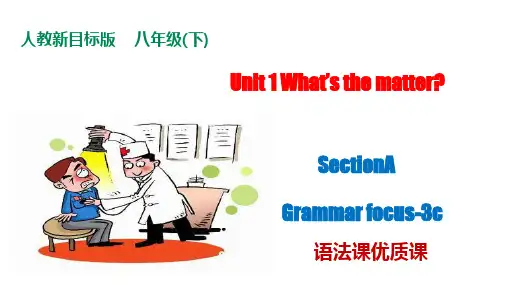
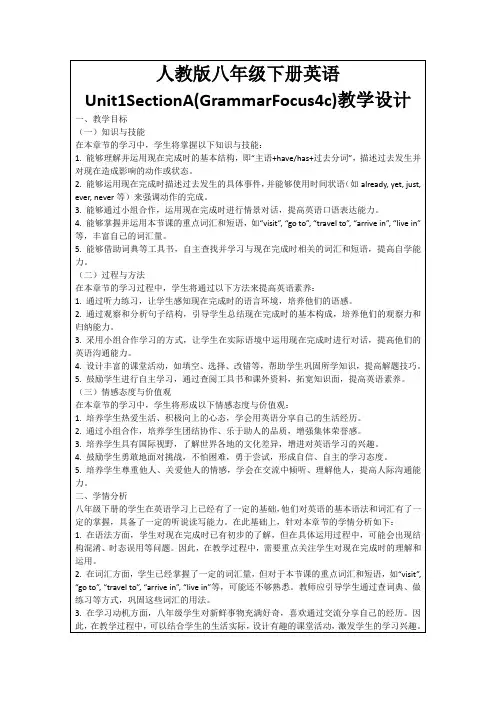
Unit1 SectionA(Grammar Focus-4c)教案一教学目标:1、知识与技能:①能正确使用“have + (a) + 病症”结构谈论健康问题(have for talking about health problems)②能正确使用情态动词should提出恰当的建议(modal verb should/shouldn’t for suggestions)③能正确使用反身代词(reflexive pronouns)2、情感态度与价值观:在别人遇到困难的时候,给予合理的建议并提供帮助;学会照顾他人及自己。
四、教学重难点1、重点:如何准确地表达病症,并提出合理化的建议。
2、难点:运用所学的语法知识去解决实际问题。
三(Teaching Procedures):Step1:Greetings and talking1.教师向学生表示友好的问候,并复习之前所学到的问候语。
2.采用多种自由交际方式,创设浓厚的英语学习氛围与学生进行Step2 Review1.展示图片复习上节课学习的身体部位单词2.展示图片进行师生互动复习上节课的句型:A:What’s the matter?B: I /He/She___________. What should I /he/she do?A:You /He/She should ____________________Step3 Presentation1.Finish Grammar FocusLet students read together loudly.2.归纳总结(1)对疾病询问What’s the matter/trouble/problem (with sb.)? What’s wrong/up (with sb.)?(2)对事故伤害询问What happened?What happened+to sb?(3)回答:病情一般都是have/has a…1.have a/an+病症2.have+a/an+身体部位-ache3. have a sore+身体部位hurt 意为“受伤”,表示什么部位受伤。
Section A Grammar—4c Period ThreeLearning aims:1.To learn to talk about health problems and accidentsEg.What’s the matter (with Ben)?Do you have a fever?2.To learn to use “have” to talk about health problems: have + (a) + 病症Eg.He has a sore back.3.To learn to use modal verb should/ shouldn’t for suggestionsEg.You shouldn’t eat so much next time.Should I put some medicine on it?4.To learn to use reflexive pronouns to talk about accidentsEg.He hurt himself.Review and check:Make conversations like this:1. A: _______ the matter? B: I _____ a sore throat.2. A: _____ Mike ____ a fever?B: No, he _______. He ___ a stomachache.A: He ______ drink some hot tea.Give guidance and learning detection【自学指导】自读Grammar Focus两次,弄懂含义。
【合作探究】1、组内熟读Grammar Focus, 并演练对话。
2、独立完成4a、4b,小组内互相检查,解决疑难。
hurt oneself What should I do?You should see a doctor and get an X-ray.3、共同划出你们认为重要的短语、句子。
Unit 1 What’s the matter?Section A (Grammar focus – 4c)教学目标:①Learn and master how to talk about the health problems and accidents.②Learn and master how to give some right advice to others with the target language.教学重点:1. Be able to understand the passage about the accident.2. Learn to talk about health problems and accidents and give advice by using “should/ shouldn’t”.教学难点:1. Learn to talk about health problems and accidents and give appropriate advice.2. Learn how to get information from the passage and train students’ reading and writing skills.德育设计:Take good care of ourselves, and help others教学方法:Task-based language teaching method, the cooperative learning method, and multimedia-assisted teachingand learning method.教具学具:Books,chalks,tapes,computer and so on.教学过程:Step 1 Warming-upSing the English song “Head Shoulders Knees and Toes”.Step 2 RevisionT: This is really an interesting song. What is it about ?Ss: It is about body.T: Yes. Head and shoulders are parts of our body; do you know other parts of our body in English?Ss:(Show a picture about body, students say them together.) Head, nose,eye, ear …Students read these body parts together.Step 3 PresentationThe teacher asks : How about your body? If you are sick, what will you say in English? Show some pictures to students and review “What’s the matter? ” Practice these conversations.Look and say: What’s the matter? I have a cold./I have a fever./ I have a toothache./ I I have a stomachache./I have a sore back./ I have a headache./ I have a cough and a sore throat./ I cut myself.Step 4 Listen and Say1.Listen and number the key words [1-5] in the order you hear them.toothachecough and sore throatfeverstomachachecut myselfPlay the tape for the students,then check the answer.The right answer: 4,2,1,3,5.2.How do we give advice if somebody is ill?You should …你应该……e.g.A: I have a toothache.B: You should see a dentist.用法展现shouldshould 属情态动词, 后接动词原形, 没有人称和数的变化。